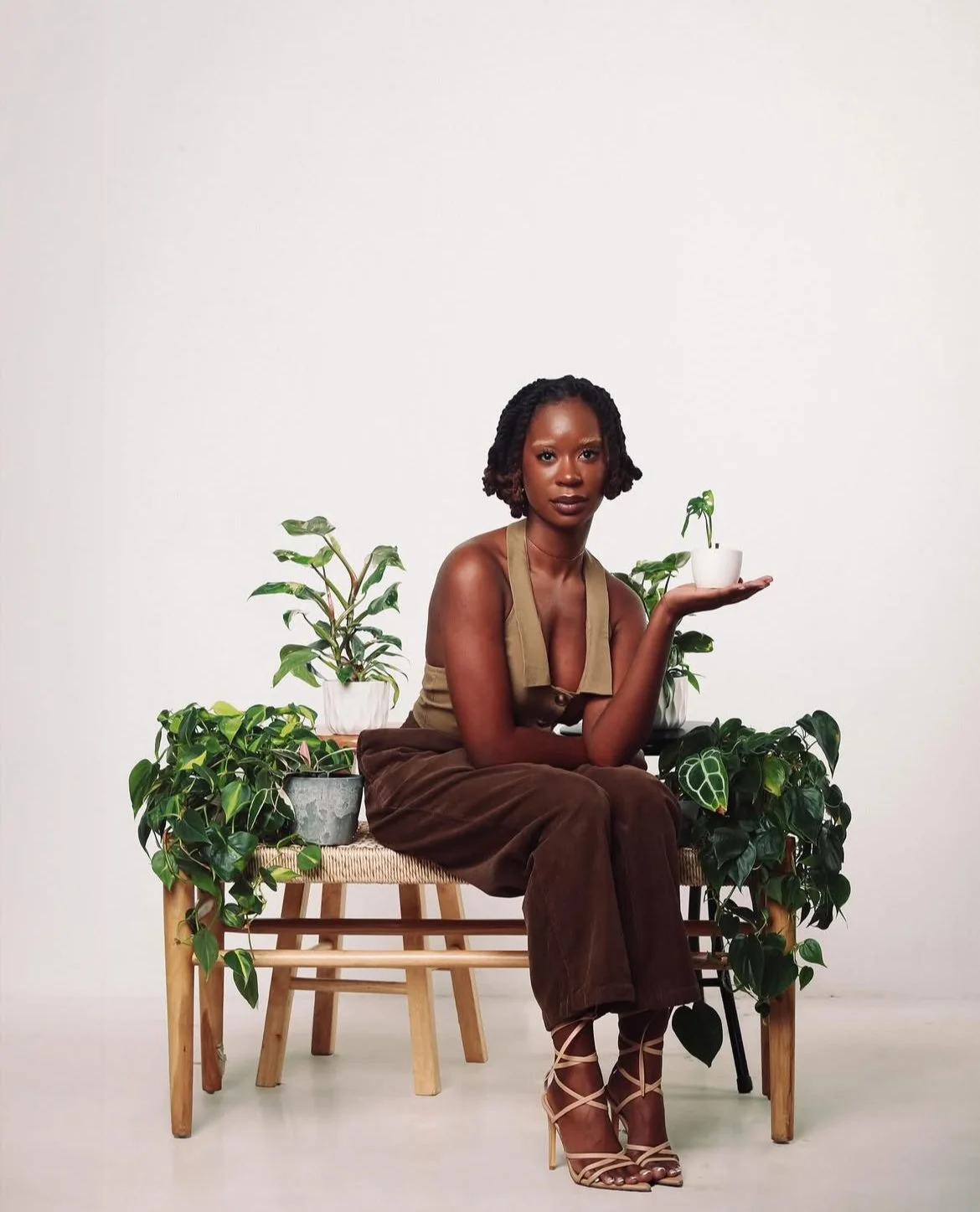Ladies and gentlemen, Paige Tailyn (All rights reserved to owner)
Paige Tailyn is a vibrant plant enthusiast and educator from Atlanta, rooted in the belief that nature is a portal to healing, heritage, and self-discovery. With a passion for reconnecting communities to ancestral knowledge through green spaces, she blends Southern culture with plant-based wisdom in every lesson she leads. From classrooms to community gardens, Paige is cultivating more than plants—she’s nurturing liberation. But her passions don’t stop there, she is also the Events & Brands Coordinator for the Creative Collective NYC.
The tradition of planting roses bushes with your grandmother Pamela played a pivotal role in your introduction into gardening. In what ways do you see your grandmother’s influence showing up in how you care for plants and yourself today?
PT: My grandmother was very audacious—dare to be bold, not gonna hold back, cutthroat, as some people may say. But she did it in a way that didn't feel like it was too much. Oftentimes, as I've cared for my own plants but also coached other people to care for their plants, one thing that I've noticed is that people do too much—I do too much sometimes, too. But through my grandma, she effortlessly got her thoughts and opinions across but didn't have to do too much, and I think it's the same way with plants. Plants are very intelligent beings. They know what they're doing, they know how to grow. Their root systems are very intelligent; they function on their own. And so people get too handsy with their plants, and that's often their downfall. They say, “Paige, I repotted my plant, I put it in the sun, and I gave it water,” and it’s like, “Girl, your plant was fine—you did too much.” So that's one lesson I've learned from her. Second is, like I said, she was unapologetic, and she also had this energy to her that was just, “Well, I'ma do it anyway, and who gonna stop me?” So I've kind of curated my life around that saying—like, “Who’s gonna stop me?” I'm gonna live my life. The worst answer I can get is no. The worst thing that can happen with my plants is it can die. So, why not try my hand at a plant that I've never collected before? I may like it; I may not f*ck with it. Dare to be dangerous. Dare to be bold. Just live life. At the end of the day, it's a learning—it's a curve. All of this is a learning curve
Paige moderates a panel for CultureCon on Campus (All rights reserved to owner)
While attending Clark Atlanta University you launched your platform “Blossom Effect” with the intentions of helping others discover their purpose, while uncovering your own. What did creating that space mean to you personally at the time?
PT: I always laugh when I tell this story, because you know when you do something, but you really just be doing stuff because you can do stuff—but you never really know what you're doing because you're just doing it? Right? Okay, so yeah, you just do it, and then it's like, “Oh really? Like, the ancestors were speaking through me, and I didn't even really know.” It was full circle moments.
When I came to Clark Atlanta, I was like, “I have to curate a space in which people are able to acknowledge the now and able to see the growth through themselves in this moment.” Because oftentimes, we're just doing, doing, doing, and we're not seeing the growth. We've got to acknowledge it step by step.
So when I came up with Blossom Effect, it was actually through the Miss CAU at the time. I was an intern for the Royal Court, and she looked at me and said, “Paige, you have blossomed into just such a beautiful woman,” and I said, “Oh, you really just did something there.” So I curated Blossom Effect, and the whole goal was to hone in on people's education—because we're on a college campus—but people believed in Blossom Effect more than I did. Even though I was like, “Blossom Effect, I want to be Miss Sophomore, and I want to curate a garden on campus,” what really got me was people would walk up to me and be like, “Blossom Gang, Blossom Gang, hey Blossom Gang!” and I was like, “Oh wait, this is really something.” So between my grandma's passing, and then curating something on campus, and having other people reiterate it to me, I was like, “Okay, it's a moment. People hear it, people see it—we gotta keep it going.”
“ Between my grandma's passing, and then curating something on campus, and having other people reiterate it to me. I was like,Okay, it's a moment, people hear it, people see it, we gotta keep it going.”
- Paige Tailyn
This year, you made a bold pivot from your 9-5, leaving your role as an Events and Brand Coordinator at The Creative Collective. How did you know your path was starting to stretch beyond your role? And what learnings do you still hope to take with you?
PT: When I first started at the Creative Collective, I started as Imani's Executive Assistant. I graduated right when COVID hit, and I was like, “What the hell we gonna do? I needed something.” I reached out to Imani—just like a one-off email. I was like, “Hey, listen, I love the Creative Collective. What do you need from me? Please.” So I was her Executive Assistant for about a year and a half, and then she looked at me and said, “I gotta get you off my desk.” I was literally like, “Is this woman firing me? Like, on a Zoom? Like, this is how you fire me, Imani?” She's like, “No, you can't stay an Executive Assistant your whole life.” And I said, “You right girl, you ain’t wrong for that.” She then asked, “So what do you want to do?” And I said, “Well, I like brands. I like the brand world.” She said, “Well, I'm gonna put you over there,” and I said, “Okay, cool.”
Through working with the brands, I also got to work with amazing, dope-ass Black creatives. Not only working under a spearhead like Imani Ellis—I then pivoted to working directly with the folks that we curated a community for. And so through that, I was like, “Wait, this is what it's all about! I'm around all these creatives—let me showcase my creativity.” And while I've always collected plants, I never showcased them. And so, while working with the Creative Collective, I was able to be around other creatives. They inspired me, and Imani boosted me up—she was like, “Girl, go ahead and do what you gotta do,” and I started posting. There was a point in time where I was posting so much that Imani said, “Paige, things are gonna change for you.” And I said, “What do you mean by that?” She said, “Your platform is doing what it's doing, and I love that for you. But your time here is gonna look a little different.” And I said, “You are so right.” So that was a shift.
Paige Tailyn partners with Urban Outfitters and Pinterest to host a back-to-school marketing event redesigning her ideal space (Elvin Abril)
Black people have pioneered more in the plant industry than we realize. With education at the center of your work, how does reclaiming this history help reshape the narrative around who belongs in plant spaces?
PT: Every day we wake up, and there's something fucking new about history—it's being rewritten as we speak. National holidays are being stripped and then rewritten back into law by someone who doesn’t even really care about them.
So now, more than ever, I—beyond even being a plant enthusiast—am pushing every person of color to be a historian in their own right. So let's say you like surrealistic art. I need you to go be a historian about all the Black surrealistic artists that came before you. We have to document them. We have to speak them out. We have to write them down. We have to keep this going—because history is being rewritten as we speak.
In the plant game, this industry is very whitewashed. We can go back decades and see that all the plants we bring into our houses have white names. We have to realize the white botanists that collected these plants were actually poaching them from native regions—and then dilapidating those regions—so that people could buy the plants under their names and they could get the money for it. I think sometimes it does strike people—or rub people the wrong way—because they're just like, “A plant is a plant is a plant, and let’s just keep it about the plants.” But one thing I’m not about to do is keep it about the plants. Because everything is absolutely political. Because behind every plant is a story.
What role does representation play in helping the next generation believe that their dreams and aspirations are truly possible?
PT: When I came into this game—online specifically—I could literally count on one hand how many Black botanists were online. I had watched them for a very long time, whether it was YouTube, TikTok, or whatever. I was like, “There are so many Caucasian plant enthusiasts and educators online, but nobody looks like me.” How do I go about taking space in this industry? How do I tell the stories in a way that's digestible, engaging, entertaining—but also serious? Like, I want you to know, “I'm being deadass.”
And so, watching the five Black plant enthusiasts online encouraged me—little Paige who graduated from Clark Atlanta with a Mass Media Arts degree in Radio, TV, and Film—to say, “Well, let me pick up my camera.” There are arenas in which we are very silent, very quiet, very hidden, and not vocal enough in. And that’s not because we don’t want to be—it’s because, systemically, we’re not at an advantage. Through my craft, I encourage little Black girls, Black boys, BIPOC peoples of any kind to take up space in this room, too. When I go to these conferences, it’s nothing but old white men. They're just buying up all the plants to resell them—but who do you think is taking care of and managing all those plants? We have to make our voices known and heard. And so, by me taking up space and curating this platform, I’m hoping that it touches one little Black girl, one little Black boy, who goes to school to get their degree in Botany or studies Horticulture—something in that realm—and they keep the knowledge going too.
Want to hear more amazing stories like this? Check out our “More of Us” series! If you want to connect with Paige and support the work she is doing, follow her on social @paigetailyn and her initiative Blossom Effect.



